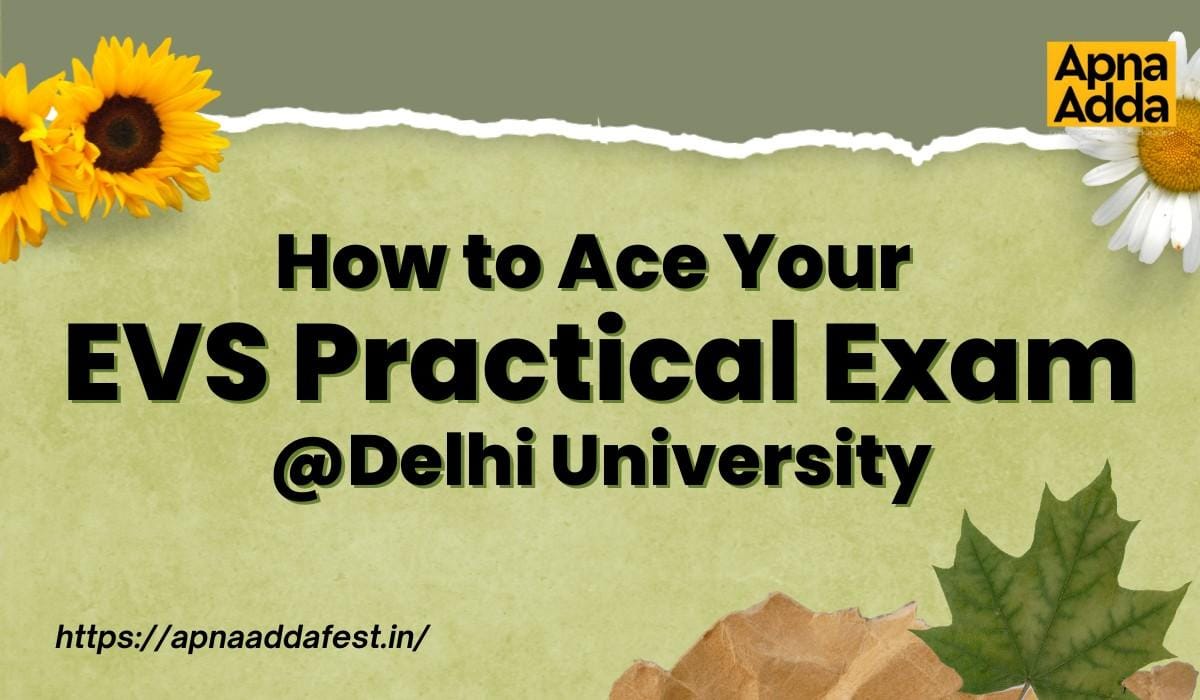How to Ace Your EVS Practical Exam at Delhi University

A Complete Guide
Environmental Science (EVS) practical exams at Delhi University may seem daunting at first, but with the right preparation and strategies, you can not only pass but excel.
EVS practicals are an opportunity to showcase your understanding of environmental issues. Don't worry, we are going to cover everything that would help you to ace this practical.
Table of Contents:
Understand The Syllabus
The first step to excelling in your EVS practical exam is understanding the syllabus. While EVS covers a range of topics, from ecosystem studies to pollution, biodiversity, and sustainable development, the practical exam typically includes hands-on experiments, fieldwork, and viva questions based on these themes.
Here’s what you should focus on:
- Field-based Assignments: You may have to conduct field studies on biodiversity, soil quality, or water sampling. Know the methods for these and familiarize yourself with common species of plants, trees, and animals.
- Case Studies and Data Analysis: Be prepared to analyze data, interpret graphs, and draw conclusions about environmental trends.
Create a Study Plan and Start on Time
Leaving practical preparation to the last minute is a mistake. EVS practicals require both theoretical knowledge and hands-on skills, which need consistent practice.
- Divide Your Syllabus: Break down the syllabus into sections such as field assignments, lab experiments, and data interpretation.
- Set Weekly Goals: Dedicate certain weeks to specific skills or topics.
- Practice Regularly: Schedule regular lab sessions if possible. The more you practice experiments, the more comfortable you’ll be handling equipment and analyzing results.
Know your Case Studies
Case studies are an integral part of EVS practical exams, as they connect theory with real-world applications. The examiner may ask you to analyze an environmental case study, interpret data, or suggest potential solutions to issues.
- Familiarize with Local Case Studies: Delhi and its neighboring regions face unique environmental challenges, such as air pollution and the Yamuna River’s pollution. Go through relevant case studies on these topics to understand local issues.
- Look at Global Examples: Be aware of some global environmental case studies, like the Chipko Movement or the Save Silent Valley movement. These are often discussed in viva and theory exams.
Prepare for Viva Questions
The viva can be the most unpredictable part of the practical. However, preparing well can help you tackle most questions with confidence.
- Review Core Concepts: Examiners may ask about the purpose of specific experiments, the significance of certain results, or general concepts like sustainable development, biodiversity, and pollution control.
- Relate to Current Events: EVS is a dynamic subject connected to current environmental issues. Stay updated on recent events, such as changes in pollution levels or new environmental policies in India. This can impress your examiners and show that you’re well-rounded in your knowledge.
Learn in Groups
Studying in groups can be very effective, especially for practical exams. Group discussions allow you to clarify doubts, learn new perspectives, and practice viva questions.
- Assign Topics to Each Member: If each person becomes an expert in a specific topic, you can teach each other and deepen your understanding.
- Role-Play for Viva Practice: Have one person play the examiner while others answer viva questions. This will help build your confidence and improve how you communicate your knowledge.
Compile a Practical Notebook
In addition to lab work, maintaining a well-organized practical notebook can be crucial. Many professors award marks based on the quality and completeness of your practical record.
- Document All Procedures: Write down each experiment in detail, including steps, observations, and results. This will be your go-to guide for revision.
- Add Diagrams and Graphs: Visual representations can make your notebook look professional and demonstrate your understanding.
- Summarize Key Findings: Include a brief summary at the end of each experiment to highlight what you learned and how it relates to environmental issues.
Resources
While many resources are available for EVS, knowing which ones are reliable and relevant can save you time and energy Here are the recommended resources for preparing for your EVS practical exams at Delhi University, along with their links:
Delhi University EVS Lab Manuals and Notes
- These are typically provided by your college. Make sure to check with your department or faculty for access.
Books on Environmental Science
- Environmental Studies: From Crisis to Cure by Rajagopalan
- A Handbook of Environmental Science by R. Kumar
YouTube Channels
- Learn & Explore provides videos on practical lab techniques and environmental case studies.
- Unacademy EVS Lectures: Offers lectures that go over theoretical concepts and practical skills.
Practice Sheets and Past Year Viva Questions
- DU Exam Archives: Check the Delhi University archive for past question papers to understand the type of questions asked in viva.
- Online PDFs and Practice Questions: Websites like Academia.edu and ResearchGate have shared practice sheets and research articles related to EVS practicals.
Current Affairs and Environmental News Sources
- Down to Earth: This magazine covers current environmental issues, making it a valuable resource for keeping up with recent trends.
- The Indian Express Environment Section: Regular updates on environmental issues in India, which may be useful for viva questions.
Final Tips
- Arrive Early: Reach the lab at least 15-20 minutes before the scheduled time to set up your materials and calm any nerves.
- Stay calm and organized: Take deep breaths and approach each experiment methodically. A calm demeanor will help you think clearly and avoid silly mistakes.
- Be Ready to Improvise: Sometimes, equipment may not work as expected. If this happens, explain the alternative steps you would take and what results you would expect.
Acing your EVS practical at Delhi University is all about preparation, practice, and confidence. Start early, focus on understanding the concepts, and don’t hesitate to ask questions. With the right resources and strategies, you can tackle any practical or viva question with ease. Best of luck!
Happy studying!
For more such interesting and exciting updates about your college and upcoming festivals, stay tuned to ApnaAdda.
